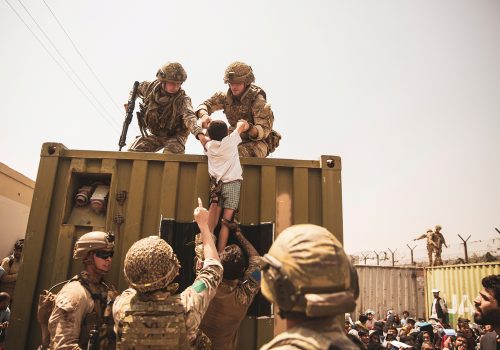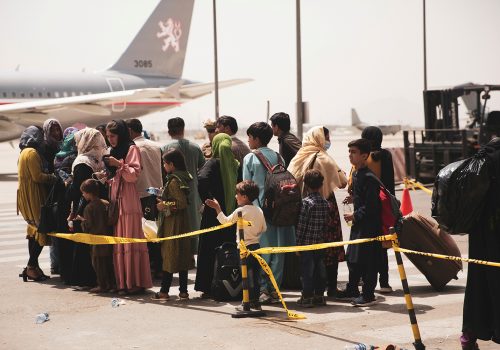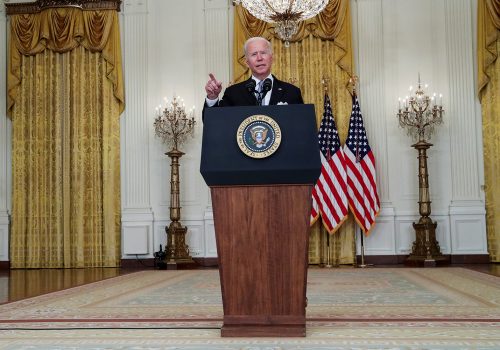FAST THINKING: Terror strikes Kabul airport
JUST IN
The worst fears have become reality. Suicide bombers detonated explosives at two locations outside the Kabul airport today, killing at least thirteen US servicemembers and sixty Afghans. The attacks come amid an evacuation effort in which some 100,000 people have been airlifted from Kabul over the past two weeks, following the fall of the capital to the Taliban. “We will not be deterred by terrorists. We will not let them stop our mission. We will continue the evacuation,” US President Joe Biden said from the White House. What is motivating the terrorists behind the blasts? What does this mean for evacuations? Our experts, steeped in the security world, have the answers.
TODAY’S EXPERT REACTION COURTESY OF
- Thomas S. Warrick (@TomWarrickAC): Nonresident senior fellow and former counterterrorism official at the Department of Homeland Security
- William F. Wechsler (@WillWechsler): Director of the Rafik Hariri Center and Middle East Programs and former US deputy assistant secretary of defense
- Kirsten Fontenrose: Director of the Scowcroft Middle East Security Initiative and former US National Security Council senior director
- Mir Sadat (@Dr_Sadat_USN): Nonresident senior fellow in the Scowcroft Center for Strategy and Security and former strategic adviser to two commanding generals of the war in Afghanistan
The ISIS game plan
- The group known as ISIS-K, the Afghanistan-based offshoot of the Islamic State, has claimed credit for the blasts. The attack, Tom tells us, “is the first shot in a new war, but not the one that Americans think it is.”
- This conflict is all about who gets to claim credit for forcing the Americans out of Afghanistan. “There is a propaganda war now underway among terrorists and extremists trying to claim victory over the United States,” Tom explains.
- The attack indicates that ISIS-K will challenge Taliban rule of Afghanistan and also “will continue to pose an external counterterrorism challenge in the years ahead,” Will tells us, “likely emerging as a local competitor to the Taliban’s ally al-Qaeda.” ISIS-K will consider its attack even more successful if it “results in a renewed military conflict between its two adversaries, the US and the Taliban,” he adds.
- And Kirsten warns that the threat persists. The perpetrators will likely plot another attack since the evacuation campaign “does not have a plan B for relocating the effort to anywhere other than” the Kabul airport, she notes.
- Beyond the loss of life, another explosion would threaten the structural integrity of the airport walls. “And if one of them collapses, runways could get overrun by enemies and panicked Afghans,” Mir points out.
Subscribe to Fast Thinking email alerts
Sign up to receive rapid insight in your inbox from Atlantic Council experts on global events as they unfold.

Flight risk
- The threat of a terrorist attack was the prime reason behind Biden’s decision to stick to his planned full withdrawal of American forces from Afghanistan by August 31. Now the dangers of the operation have been made abundantly clear. “While it is likely to be denied publicly, the terrorist attack is also likely to mark the de facto end of the formal US-led noncombatant evacuation operation, especially for those without a US passport or green card,” Will predicts.
- Kirsten expects tightly coordinated and very limited evacuations of only US citizens to resume. But the situation outside the gates will only deteriorate. “With Marines killed in action by the bombing, morale will be at a new low among the US troops at the airport,” she notes. “Afghan security contractors will be terrified to work gate duty. The combination of factors will result in even lower patience with crowds outside the gates trying to get in.”
- Mir suggests expanding the perimeter so there’s not a crush of people outside the airport. “Put the Qataris on that outer perimeter because the Taliban won’t bother them,” he proposes. “Otherwise we will have this mission vulnerability until August 31. We have already lost the majority of our ground-based information capabilities to warn of threats.”
- The State Department said today that about one thousand Americans are still in Afghanistan, and most of them want to leave. If some are left behind, “that will raise the risk of the Taliban or aligned organizations taking more Americans hostages, which will likely be a continuing challenge for years to come,” Will says.
Intelligent design
- US and allied governments warned about an imminent attack at the airport in the hours before the blasts. “That intelligence is going to be harder to get once the US military leaves Kabul,” Tom points out.
- Will contends that the attack raises new questions about the US “over-the-horizon” counterterrorism strategy post-withdrawal. That approach entails physical distance from the target and working closely with partners on the ground.
- “In the case of Afghanistan, the horizon is especially far away, and our local partners have just been routed,” Will says. “The critical immediate objective is to rebuild those local capacities, but this time through irregular units rather than the formal Afghan government, which is now Taliban-controlled.”
- That could mean coordinating counterterrorism operations with the Taliban, Kirsten points out: “But how do you motivate US troops to cooperate with the very extremist group to whom they just had to capitulate?”
Further reading
Mon, Aug 23, 2021
David Petraeus: ‘The Taliban are about to be acquainted with a very harsh reality—that they are broke’
New Atlanticist By
General David Petraeus told the Atlantic Council that it is time to recognize a new reality and to move forward after Afghanistan. But, he says, the United States still has an opportunity to influence the Taliban.
Fri, Aug 20, 2021
FAST THINKING: Will the Kabul airlift succeed?
Fast Thinking By
How is this effort playing out? Where are Afghans going? What could go wrong? Our experts are here to get you ahead of this fast-moving story.
Thu, Aug 19, 2021
What Washington owes the American people after its Afghanistan failure
New Atlanticist By Christopher Preble
The discussion about what the United States should do in the aftermath of its war in Afghanistan should proceed in three phases: now, soon, and soon thereafter.
Image: Crowds of people show their documents to US troops outside the airport in Kabul, Afghanistan, on August 26, 2021. Photo by a Reuters stringer.


